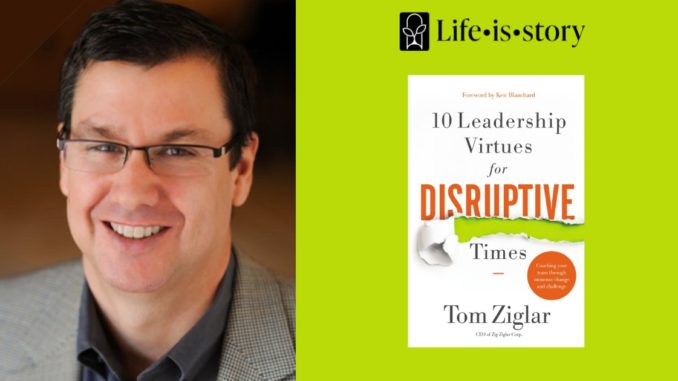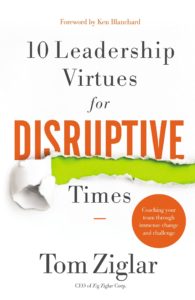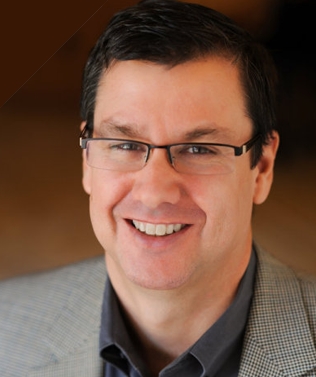
Podcast (beyond-the-page): Play in new window | Download
Subscribe: Apple Podcasts | RSS
It seems like news media everywhere are talking about “The Great Resignation.” In the wake of COVID-19 lockdowns, workers realized that they didn’t want to go back to “normal.” Normal wasn’t working. And business leaders committed to that normal perspective have been floundering. Into all that comes Tom Ziglar. Tom is the CEO of Ziglar Corp. and son of one of the original leadership gurus, Zig Ziglar. His latest book is 10 Leadership Virtues for Disruptive Times and is designed to help leaders change their outlook toward delivering employees a better quality of life. Interesting in hearing more about the book—and his take on “The Great Resignation”—I knew I had to have him on the podcast.
The Conversation | Tom Ziglar
This interview excerpt is lightly edited for clarity and conciseness. Listen to the full interview in the player above or wherever you get your podcasts.
Josh Olds: Normally, I like to begin by asking authors about their inspiration and why they wrote the book they did, but yours seems pretty obvious. We’re two years into the COVID-19 pandemic and it seems like many work environments are going back to normal. What makes this book relevant now?
Tom Ziglar: My first book was Choose to Win and I did it as part of a two book deal with Thomas Nelson. When we agreed, I said, “I don’t know what the second book is.” And they said “Don’t worry about it, you’ll have a year.” And so the end of 2019, I started writing that book, and then 2020—everything changed. Like everybody, I got really fascinated with all the business changes that were going on and started studying kind of the dominoes that fell when we went home from work. And there were lockdowns and remote and hybrid work—all these trends started happening. So I began to write the book really around this focus in April or May of 2020.
It’s going to take a generation to figure this out. – Tom Ziglar
One of the components of the book is that not only are we in disruptive times, but it’s only going to increase in frequency and intensity. And looking at the world stage: the convergence of technology, the supply chain, and the great resignation. It just keeps going on and on. And the fact of the matter is, is that the world is just rapidly going through these disruptions. I mean, the book would have been great six months ago or a year ago. But I think it’ll be even more powerful and more appropriate six months or a year from now, just because the frequency and intensity of change is going up. And the way people are deciding on where they work and how they work and the way leadership needs to adapt in order to meet those needs. That’s a big deal. And it’s going to take a generation to figure this out.
Josh Olds: I know that, you know, right when everything shut down, you know, almost immediately within months, there were dozens of books about how to live in the era of Coronavirus and from business standpoint, spiritual standpoint, and so on. It was just sort of like everyone’s trying to figure out how to navigate this. This is something that is born out of COVID, but it’s meant for something much larger than that. We are not going back to normal in what the old normal was in the business world. What are some good things that you’ve seen come out of those changes that we’ve had to make?
Tom Ziglar: Yeah, well, here’s the first one and, and I’ll just—I’m showing you my fist if you’re listening to this, just imagine I’m making a fist—this is prior to 2020. The fist represents work, it was your career, it’s what you did. It’s where your identity was. And then everything kind of revolved around that you know: your physical health, your mental health, your relationships, your family, even faith, a lot of times. Work took center, that was the priority, and everything else revolved around that. When the pandemic happens, we lose loved ones, friends get sick, our job becomes uncertain. We might have changed careers, we had to go through a lot of situations and trials. And then people started saying, “You know what? Life is shorter than I thought.” To the younger and middle aged, death became very real. And all of a sudden, people said, “I want my time here to count, I want to make a difference. I want to be a part of an organization, a business, a career, that makes a difference. I want to see the vision and mission of the company that I’m with and I want to align with that. And I want to make sure that their virtues line up with what I believe.”
People are in this “Great Resignation”, which I call the Great Reimagination. – Tom Ziglar
So now, what you see is when you put the fist up, the fist is the core values. So now it’s the mental and physical health, it’s the faith, it’s family, it’s all these different things. And that’s the priority and work is starting to revolve around that. So that’s a big C change. Now people are in this “Great Resignation”, which I call the Great Reimagination. People are kind of like, well, gosh, I can make more money, and have more flexibility, more autonomy, doing something else. I can work from home, I think in the US, like close to 3 million women went home from the pandemic and a huge percentage of them aren’t going back to the job they had. They’ve created their own job, they’re doing different things. People with disabilities, people who felt kind of on the outside, they’re thriving in this environment. But I think it’s because core values are at the center.
At Ziglar, we’ve been teaching this for five decades: You’ve got to have balanced success. There are seven areas: there’s the mental, the spiritual, the physical, the family, the financial, the personal and the career. The second word I mentioned was spiritual. So this is what’s more good news to me. The number one issue in large companies is the health and well-being of their employees. They are starting to recognize that people have all these different dimensions, and spiritual is one of them. So I see the spiritual conversation and faith—instead of being kind of a taboo, we don’t talk about it here—it’s now come to the understanding that that’s an important foundation and cornerstone in people’s lives. And in order for them to be productive and perform at the highest level, they’ve got to be solid in that in order to do a job well. Business has finally figured out that the quality of life equals quality of work.
The Book | 10 Leadership Virtues for Disruptive Times
 Tom Ziglar, CEO of Zig Ziglar Corp, shares ten leadership virtues that are essential for coaching employees through immense change and creating an environment of maximum potential and productivity.
Tom Ziglar, CEO of Zig Ziglar Corp, shares ten leadership virtues that are essential for coaching employees through immense change and creating an environment of maximum potential and productivity.
With the world changing so rapidly, many leaders are struggling to find new ways to make a significant and positive impact on their team. The key, says Tom Ziglar, is to consistently bring out the best in everyone by focusing on ten core virtues: kindness, humility, respect, persistence, selflessness, encouragement, positive expectations, self-control, firmness, and hope.
Delivering cutting-edge new research, wisdom gleaned from experience, and poignant insights from his work at Zig Ziglar Corp, Tom Ziglar identifies the communication styles that will keep everyone on the same page, regardless of their working environment. He also emphasizes the importance of closing the “empathy gap” between management and staff in order to create a more connected team that operates to its fullest potential–and how developing each team member’s unique dreams, goals, and abilities sets up the company for success.
In 10 Leadership Virtues for Disruptive Times, Ziglar shows why “coach leadership,” instead of management leadership, is the best way to lead through immense change and challenge. It is essential guidance for leaders who want to coach their teams through inevitable periods of disruption with the goal of helping them thrive at home and at work.
The Author | Tom Ziglar
 Tom Ziglar is the proud son of Zig Ziglar and the CEO of Ziglar, Inc. He joined the Zig Ziglar Corporation in 1987 and climbed from working in the warehouse, to sales, to management, and then on to leadership. Today, he speaks around the world; hosts The Ziglar Show, one of the top-ranked business podcasts; and carries on the Ziglar philosophy: “You can have everything in life you want if you will just help enough other people get what they want.” He and his wife, Chachis, have one daughter and reside in Plano, TX.
Tom Ziglar is the proud son of Zig Ziglar and the CEO of Ziglar, Inc. He joined the Zig Ziglar Corporation in 1987 and climbed from working in the warehouse, to sales, to management, and then on to leadership. Today, he speaks around the world; hosts The Ziglar Show, one of the top-ranked business podcasts; and carries on the Ziglar philosophy: “You can have everything in life you want if you will just help enough other people get what they want.” He and his wife, Chachis, have one daughter and reside in Plano, TX.
